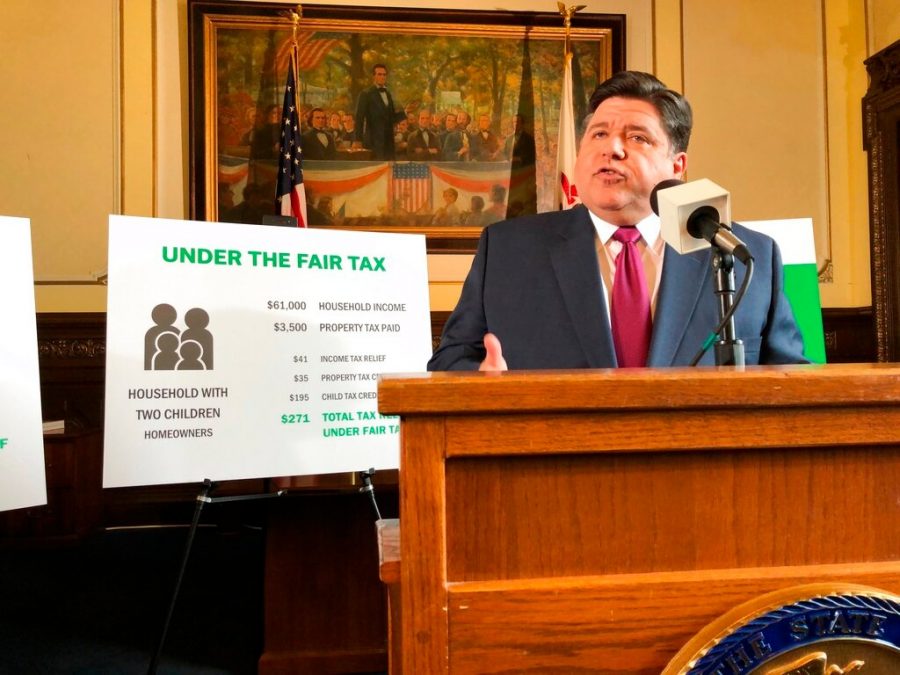Illinois graduated income tax: Fair tax or tax hike?
Supporters and opponents of the Illinois Allow for Graduated Income Tax Amendment, which is on the ballot this November, hold opposing views on how it would affect the state’s economic future
AP Photo/John O’Connor File
On Mar. 7, 2019, Governor J.B. Pritzker outlines his plan to change Illinois’ flat-rate state income tax to a graduated structure at the State Capital in Springfield
In the upcoming Nov. 3 election, Illinois residents will be voting in a referendum on the Illinois Allow for Graduated Income Tax Amendment.
This amendment to the Illinois Constitution would eliminate the constitutional requirement for state income tax to be collected at a flat rate and establish a progressive income tax structure. Depending on one’s income level, new state income tax rates ranging from 4.75% to 7.99% would replace the current universal 4.95% rate.
Many Illinois residents, even those who do not follow politics, are likely aware of this referendum. In recent weeks, advertisements about it have dominated the airwaves and the internet.
Most advertisements in favor of the amendment come from the Vote Yes for Fair Tax PAC, to which Governor J.B. Pritzker has donated $56.5 million out of his own pocket. Most advertisements opposing the referendum are funded by the Coalition to Stop the Proposed Tax Hike, to which Kenneth Griffin, a Chicago-based hedge fund manager and Illinois’ wealthiest resident, has donated $46.75 million.
Advertisements featuring buzzwords such as “fair tax” or “tax hike” oversimplify this issue, but they highlight its two main camps. In general, graduated income tax supporters believe that it would make taxation in Illinois fairer, while its opponents contend that raising taxes on high-earners would harm the state’s economy.
Apart from Governor Pritzker, noteworthy supporters of the graduated income tax include Democratic elected officials, AARP Illinois, and most major labor unions. The concept of fairness in taxation that supporters argue for is simple—lower-income individuals should pay less income tax because each dollar earned is worth more to someone making less money than to someone making more money.
The head of the New Trier Young Democrats club, junior Rosemary Wynnychenko, supports the graduated state income tax for that reason.
“I support it personally because I believe it doesn’t make sense that someone who makes a million dollars a year should pay the same tax rate as someone who makes minimum wage,” said Wynnychenko. “That just doesn’t fundamentally make sense.”
Supporters also point to the fact that Illinois is an outlier compared to most states for not having a progressive income tax, as 32 states already levy a graduated income tax.
If enacted, the new tax plan is estimated to raise an additional $3.4 billion in annual revenue. This additional funding could help to combat Illinois’ budget woes—the state is on pace to fall $6.2 billion deeper in debt this year—and to fund social programs.
“When we Vote Yes for Fair Tax, we can cut taxes for everyone under $250,000, make the wealthiest pay their share, and raise $3 billion to fund schools, health care, new infrastructure, and good jobs in every community,” said Illinois AFL-CIO President Tim Drea for a recent article in left-wing media outlet One Illinois.
Opponents of the graduated income tax—including Griffin, Republican elected officials, the Illinois Chamber of Commerce—consider Drea’s perspective short-sighted. They worry that continued budgetary mismanagement, combined with the end of flat state income taxes, will eventually cause everyone’s taxes to increase, not just high-income individuals.
The head of the Trevian Republicans Club, senior David Tabarez-Cisneros, is concerned about this possibility.
“Some of the other members also expressed concern with the possible downside of the tax and how it could actually have an effect on more middle-class workers,” said Tabarez-Cisneros. “[There’s a] potential risk for certain middle-class workers and even other groups to be taxed at an even higher rate as years go on.”
Another concern of opponents to the graduated income tax is that it will accelerate Illinois’ loss of jobs and population. The state’s population has declined in each of the last six years. Raising taxes on higher income, often job-creating individuals could accelerate that decline.
“I am committed to ensuring each of us has the facts to make a thoughtful decision about this catastrophic constitutional amendment,” Griffin said in a recent Wall Street Journal article about the potential economic harm of the graduated income tax.
Forecasts split on what ultimate economic effect the graduated income tax would have on Illinois. Some right-leaning organizations predict economic catastrophe, while other left-leaning organizations say that it will benefit the state.
Ultimately, voters will have to educate themselves on this issue and form their own opinions. The New Trier Young Democrats and the Trevian Republicans are doing just that.
For voting age students who want to hear different perspectives watch for an upcoming dialogue hosted by the political clubs.
“We are planning on having a discussion with the Republican club to discuss the issues of this election,” said Wynnychenko.









































